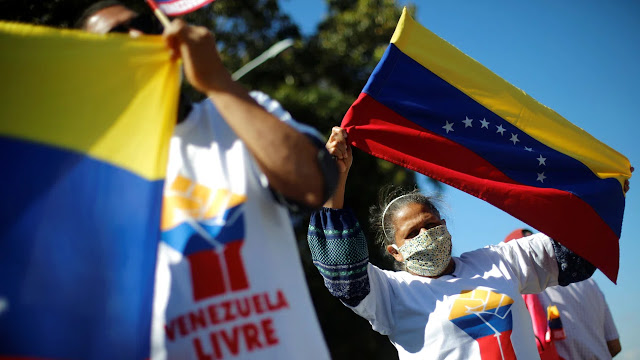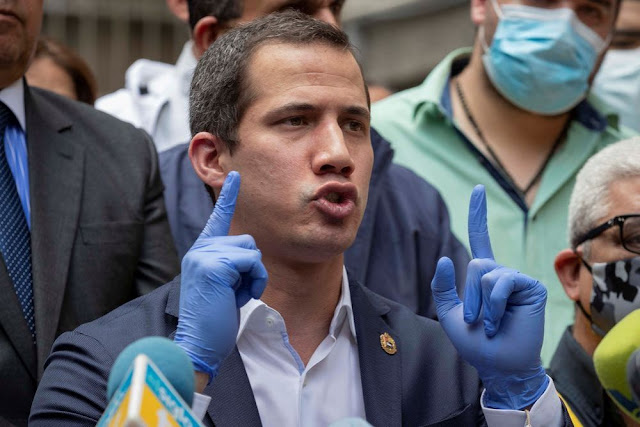Opposition Boycotts Venezuelan Election
Earlier this month Venezuelan opposition parties made it known that they are planning to boycott the legislative elections scheduled for December of this year. The announcement was not shocking, as the same parties boycotted the presidential elections two years ago. The opposition parties are led by Juan Guaido, the current president of the National Assembly and leader of the center right Popular Will party. The boycott comes at a great risk to Guaido's legitimacy as an alternative leader to current president Nicolas Maduro. If the opposition boycotts Guaido will not be reelected to his seat in the National Assembly, and therefore find himself outside the political institutions of his country. So why would he take that risk?
There are at least two theories as to why Guaido would willingly give up his seat in the National Assembly by boycotting the election. The first is that he no longer believes that his legitimacy as a politician, and possibly future leader of Venezuela, is tied to a seat in the legislature. If you're thinking Guaido's name sounds somewhat familiar, it should. After the 2018 presidential elections which saw Nicolas Maduro, the left wing successor to Hugo Chavez, hold on to power amidst calls of fraud, the National Assembly declared that Guaido would become the acting president of Venezuela. This touched off a constitutional crisis in the country. Guaido was quickly recognized by over 30 countries including Brazil, Chile, Spain, the United Kingdom, and the United States as the legitimate president of Venezuela. Guaido is also well recognized in Venezuela. After the decision by the National Assembly, thousands of his supporters flooded the streets demanding that Maduro leave office. His international backing as well as his prominence and name recognition in Venezuela currently may lead Guaido to believe that even without a seat in the legislature he still has political legitimacy.
The other theory is that Guaido, and the other opposition parties, no longer see Venezuela as a legitimate democracy, and therefore can not in good faith participate in its institutions. Freedom House, a US nonprofit that tracks global freedom and democracy, has had Venezuela's democracy score fall each year that Maduro has been in power. When he came into office Venezuela had a score of 40 out of 100, making it a semi-democracy. As of last year's report Venezuela has a 19, and is classified as not a democracy. The drop in their democracy score has happened for a number of reasons. The Maduro regime has packed the courts in Venezuela, he created a new legislature after his party was going to lose power, and he used military power to suppress dissidents. In light of these events it is not unreasonable for Guaido to conclude that participating in an undemocratic election this December would only help legitimize Maduro's claim that Venezuela is still a functioning democracy.
The United States' foreign policy thus far has been to support Guaido's claim to power in Venezuela. The US government has met with Guaido and his advisors, as well as hit Venezuela and key members of the Maduro regime with economic sanctions. These sanctions have helped to cripple an already sickly Venezuelan economy, causing hyperinflation and a mass exodus of people from the country. Broad-based sanctions may not be the US's best option, as they cause undue hardship on those who have no control over the situation and lead to anti-US sentiment in a country that already has a fairly poor perception of the US. Additionally, the US has been accused of helping support a coup attempt to put Guaido in power. This would be a mistake as well. For Guaido to hold on to his legitimacy he needs international recognition, which the US and others have already given, but he does not need international forces to put him in power. For him to effectively lead Venezuela he needs Venezuelans to put him in power. The US should continue to vocally support Guiado, offer him counsel, and level targeted sanctions on the Maduro regime.
- Evan
Bibliography
Brandt, Christopher et all. “Freedom in the World 2019.” Freedom House, February 2019, 6, 24. https://freedomhouse.org/sites/default/files/Feb2019_FH_FITW_2019_Report_ForWeb-compressed.pdf.
Gamba, Laura. “US Backs Venezuelan Opposition’s Boycott of Elections.” Anadolu Agency , April 8, 2020. https://www.aa.com.tr/en/americas/us-backs-venezuelan-opposition-s-boycott-of-elections/1930597.
Piccone, Ted . “Latin America’s Struggle with Democratic Backsliding .” Brookings Institute , February 2019. https://www.brookings.edu/wp-content/uploads/2019/01/FP_20190226_latin_america_piccone.pdf.
Vaz, Ricardo, and Lucas Koerner. “Venezuela: US Backs Guaido-Led Opposition in Election Boycott.” Venezuela Analysis, August 4, 2020. https://venezuelanalysis.com/news/14960.
“Venezuela’s Major Opposition Parties Pledge to Boycott December Election.” Reuters, August 2, 2020. https://www.reuters.com/article/us-venezuela-politics/venezuelas-major-opposition-parties-pledge-to-boycott-december-election-idUSKBN24Y0ME.





Comments
Post a Comment